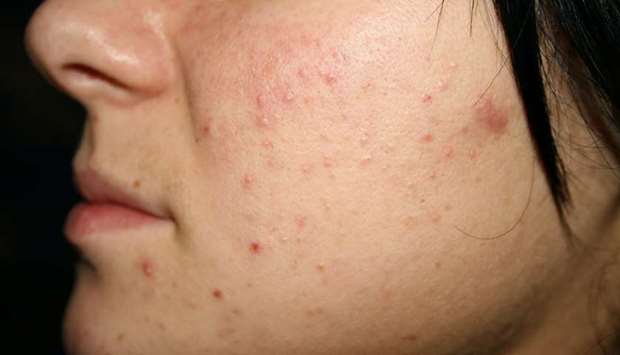Want to know the difference between acne and spots? There isn’t one, according to Dr Anjali Mahto of the British Association of Dermatologists. How many spots you have is irrelevant – even a few can really bother people. Those afflicted can become anxious, avoid social events and even stop going to work. “The mistake people make is to think acne is a cosmetic condition,” says Mahto. So if you think you might have acne, you probably do.
Adult-onset acne starts at around the age of 23 but can occur at any age in people who have never had spots before. Mahto says it affects 20% of women compared with 8% of men. It is a condition largely caused by genetics and hormones and not, as myth would have it, through dirty skin and too many chips. Even after the menopause women can suffer from acne – the male hormone androgen, in excessive amounts, is linked to the condition, but women produce it too, and during the menopause oestrogen levels drop and so the proportion of androgen rises. This causes a build up of dead skin cells and increased oil production, clogging up the hair follicles. Bacteria (Propionibacterium acnes) move in and the skin erupts in pustules, nodules (bumps) and cysts. Nodules that are inflamed and push deeper into the skin can be painful for weeks and cause scarring.
If you have painful, persistent spots you should treat them. “People don’t take acne seriously enough,” says Mahto. “About 20% of people get scarring.” Most people try over-the-counter products such as salicylic acid, glycolic acid, niacinamide, tea tree oil and benzoyl peroxide. They work in various ways, such as killing the bacteria and reducing the inflammation and skin cell shedding. If nothing is better in several weeks, you should see your GP. They may prescribe antibiotics such as Lymecycline for three months to reduce the bacteria – the time limit helps prevent antibiotic resistance and your gut flora getting messed up. Antibiotics can be used with creams or lotions such as a retinoid or benzoyl peroxide; both unclog the pores by clearing dead skin cells.
For women who want to combine contraception with an anti-acne treatment, the pill can be very effective, though some are better than others at treating acne; Mahto suggests Yasmin. A dermatologist can offer isotretinoin, which is effective, but causes abnormalities in babies and so any women using it should be on contraception. It is derived from vitamin A and hits every aspect of acne production from reducing oil production and stopping skin cells from blocking the pores to preventing inflammation. - Guardian News and Media

